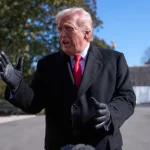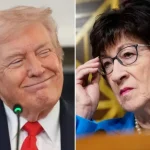
A Chinese intelligence officer sought information about the Justice Department’s criminal investigation into Huawei from a U.S. double agent just days before the Biden DOJ’s controversial decision to drop its prosecution of a Huawei executive and allow her to return to China.
Huawei’s chief financial officer, Meng Wanzhou, the daughter of Huawei’s founder, was arrested by Canadian authorities in December 2018 at the request of the United States. She was then indicted in the Eastern District of New York in January 2019 and charged with bank fraud and wire fraud. The Justice Department entered into a “deferred prosecution agreement” with Meng on Sept. 24, 2021, and agreed to drop its efforts to extradite her from Canada, and she returned to China the next day.
Newly unsealed charging documents revealed a Chinese intelligence officer was pushing an “asset who is employed by a U.S. government law enforcement agency,” dubbed “GE-1,” for information on EDNY’s Huawei case in the days leading up to the Justice Department’s decision to let Meng go free.
DOJ CHARGES CHINESE SPIES FOR OBSTRUCTING HUAWEI CASE

“In the fall of 2021, GE-1 falsely informed the defendants that he/she was meeting with members of the EDNY prosecution team to prepare for trial against Company-1,” read the Justice Department’s criminal complaint on Monday. “In response, the defendants directed GE-1 to seek non-public information from the EDNY prosecution team to prepare for trial against Company-1.”
Attorney General Merrick Garland said Monday that “in 2019, the defendants directed an employee at a U.S. government law enforcement agency to steal confidential information” about the Huawei prosecution and that Chinese intelligence “believed they had recruited the U.S. government employee as an asset, but in fact, the individual they recruited was actually a double agent, working on behalf of the FBI.” That indicates the DOJ knew about the Chinese intelligence operation when it cut the deal with Huawei’s CFO.
The Justice Department said the U.S. double agent had a relationship with Chinese intelligence officers Zheng Wang and Guochun He since February 2017 and that “since becoming a double agent, GE-1’s continued contact with Guochun He and Zheng Wang occurred under supervision of the FBI.”
The double agent sent He an August 2021 message asking, “Is there anything specific that would be helpful to know about? … [Company-1], still?” He responded, “Yes, [Company-1] still, and all about the trade talk, attitude, analysis, potential measures, targets, offers … are helpful, and of cause the specific cases of sanction aim to China enterprises are also good.”
The Chinese intelligence officer and the double agent exchanged messages between Sept. 3 and Sept. 6, 2021, with the double agent writing to He that “I think I might be able to volunteer to help a colleague with something related to [Company-1]. No promises, but I’m going to try to get involved.” The Chinese spy responded, “OK, waiting for you!” When asked if there was anything specific on Huawei he wanted to know, He replied, “Everything about this is good.”
“How about your work of [Company-1] issues?” the Chinese spy wrote to the double agent on Sept. 14, 2021. “Did you find something meaningful?”
The U.S. law enforcement employee responded, “I haven’t yet. … I can probably get something related to the [Company-1] case but I need to know the highest priority of what I should try to get.” The double agent then wrote on Sept. 17, 2021, that “I’m helping with the [law enforcement agency] side of things” with the case against Huawei. The Justice Department said He’s reply that he was trying to obtain the Huawei information for his “personal study” was false.
The double agent claimed he was meeting with the prosecution team sometime around Sept. 22 or Sept. 23, 2021, and the Chinese spy replied, “It seems an important meeting, waiting for your more details about it. Thank you for your hard work!” The Justice Department entered into its agreement with the Huawei CFO and allowed her to return to China around that time.
Shortly after Meng’s arrest in 2018, Canadians Michael Spavor and Michael Kovrig, dubbed “the two Michaels,” were arrested and then were secretly tried and convicted in China in March 2021. The U.S., Canada, and others had criticized China for its “hostage diplomacy.”
Hours after Meng’s release was announced, news broke that the two Michaels were released and headed back to Canada.
CLICK HERE TO READ MORE FROM THE WASHINGTON EXAMINER
Then-White House press secretary Jen Psaki claimed there was “no link” between the DOJ agreeing to drop its charges against the Huawei executive and China releasing two Michaels.
The Justice Department charged the two Chinese intelligence officers with criminal obstruction of justice for attempting to undermine the case against Huawei on behalf of the Chinese government, and the DOJ accused He of money laundering for attempting to use $61,000 in Bitcoin to assist with the obstruction.





